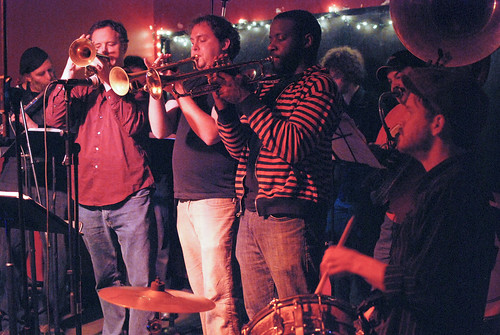
West Philadelphia Orchestra
Balkan-inspired music is not what most people would associate with West Philly, but West Philadelphia Orchestra founder and alumnus Gregg Mervine said the Balkan bands he played with in New York influence him. In 2006 he founded the orchestra, which is comprised of musicians from all different backgrounds. While the band has a heavy Eastern European influence, it creates distinct music that mixes genres to form its own new sound.
Mervine led the orchestra from its founding until June 2010. Now living in Brazil, he returns every so often to play with the West Philadelphia Orchestra. The next performance will be Feb. 9 at the Tritone Bar on South Street for its monthly “Balkan Dance Party.” The Temple News talked with Mervine and baritone player Larry Toft about their experiences with the WPO.
The Temple News: How did the West Philadelphia Orchestra start and grow into the orchestra it is today?
Gregg Mervine: I was playing with New York Balkan bands, subbing on drums, and I loved the energy and the crazy parties we played at. So I talked to some guys I knew from this West Philly bar, Fiume, and invited them to a rehearsal. Few were professional musicians. They were self-taught, or they hadn’t touched an instrument in years. Several couldn’t read music. Everyone was so unique with an unusual background.
Larry Toft: I was doing a jazz gig with [Mervine] and asked him if he’s doing anything new. He told me about this, so I joined in and invited some of my brass-player friends to join as well.
TTN: How many members are currently in WPO?
LT: Sixteen. We usually perform with six to 12 people depending on the gig.
TTN: What are the members’ musical backgrounds?
GM: I came up playing punk rock, and then I studied other styles, so I guess that’s why I’m drawn to the grit and honesty of folk music. To me, a raucous party with a brass band, whether in Mexico, Columbia, Bulgaria, North India or on Second Street on New Year’s Day is as punk, as do-it-yourself and collective as it gets.
TTN: What is the most rewarding part of playing with the orchestra?
GM: Musically, I like the moments of the shows when everyone’s sailing the ship into uncharted territory together–it’s perilous and alive. The way the crowd interacts with us and influences us is amazing and unique. Sometimes members of the band get swallowed up in the crowd so that the sound is coming from everywhere.
TTN: Is the song-writing process collaborative or is there one primary songwriter?
GM: Depends. More and more it works that one person writes out every note on paper. Then the band reads the chart, learns the notes and then we take it to the show. I personally prefer making up arrangements collectively, each adding their own part.
TTN: Your website states that your music is not strictly Balkan but sometimes includes jazz or Brazilian style. How do you incorporate different styles into songs?
LT: It’s funny, the term “Balkan” is a misnomer to describe this music because there are Balkan countries whose music and culture are quite different that of a Slavic/Gypsy brass band. We incorporate different styles because really it’s music to celebrate, so we work with whichever style will inspire this.
GM: I never say, “don’t play like that because it’s not Balkan.” I do say, “don’t play like that because it sounds uninteresting.”
TTN: How did your time at Temple help you as a musician?
GM: I studied philosophy and literature at Temple and never stepped into the music department. If you’re creative, disciplined and inspired, you’re going to make music no matter what you studied in college. Most of my favorite musicians weren’t trained in schools and most of the world’s folk-brass band players don’t read music.
TTN: What are some of your favorite things about West Philadelphia?
GM: Cheap apartments in spacious old buildings, affordable restaurants and bars, creative folks and activists–all of which are being displaced thanks to gentrification. It is a diverse place still, and there’s a sense of community to a degree, which may also be on the decline. I think a band like WPO can do a lot to draw a community together, and we as a band could do a better job working toward that end.
Maura Filoromo can be reached at maura.filoromo@temple.edu.



Hey, this ruled! I love West Philadelphia Orchestra!